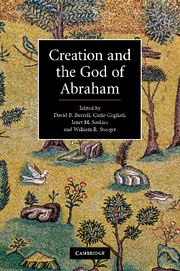Book contents
- Frontmatter
- Contents
- Contributors
- Preface
- Introduction
- 1 Creation ex nihilo: early history
- 2 Creatio ex nihilo: its Jewish and Christian foundations
- 3 The act of creation with its theological consequences
- 4 Scotistic metaphysics and creation ex nihilo
- 5 Creation and the context of theology and science in Maimonides and Crescas
- 6 Creation: Avicenna's metaphysical account
- 7 Four conceptions of creatio ex nihilo and the compatibility questions
- 8 Will, necessity and creation as monistic theophany in the Islamic philosophical tradition
- 9 Trinity, motion and creation ex nihilo
- 10 The Big Bang, quantum cosmology and creatio ex nihilo
- 11 What is written into creation?
- 12 Creatio ex nihilo and dual causality
- 13 God and creatures acting: the idea of double agency
- 14 Thomas Aquinas on knowing and coming to know: the beatific vision and learning from contingency
- Index
- References
6 - Creation: Avicenna's metaphysical account
Published online by Cambridge University Press: 07 September 2010
- Frontmatter
- Contents
- Contributors
- Preface
- Introduction
- 1 Creation ex nihilo: early history
- 2 Creatio ex nihilo: its Jewish and Christian foundations
- 3 The act of creation with its theological consequences
- 4 Scotistic metaphysics and creation ex nihilo
- 5 Creation and the context of theology and science in Maimonides and Crescas
- 6 Creation: Avicenna's metaphysical account
- 7 Four conceptions of creatio ex nihilo and the compatibility questions
- 8 Will, necessity and creation as monistic theophany in the Islamic philosophical tradition
- 9 Trinity, motion and creation ex nihilo
- 10 The Big Bang, quantum cosmology and creatio ex nihilo
- 11 What is written into creation?
- 12 Creatio ex nihilo and dual causality
- 13 God and creatures acting: the idea of double agency
- 14 Thomas Aquinas on knowing and coming to know: the beatific vision and learning from contingency
- Index
- References
Summary
INTRODUCTION
In the Middle Ages, followers of Abrahamic religions – inheritors of the Greek and Hellenistic philosophical legacy – struggled to come up with a philosophically and theologically satisfactory account of creation. The Greek and Hellenistic philosophical heritage provided at least three major ways of relating the universe to God. The universe owes to God (i) its order; (ii) its movement; or (iii) simply its existence. The first two alternatives may be traced back to Plato and Aristotle respectively. The third alternative may be associated with Platonists, especially with Plotinus, and it seems to emerge as an interpretation of Plato's position. A fourth alternative must be added to the triplet. It is that the universe owes to God not simply its existence but its existence after non-existence. This is the conception of creation which was favoured by the majority of medieval philosophers and theologians in the Western and Islamic worlds.
Avicenna (980–1037) shares concerns of his fellow philosophers and theologians affiliated with any of the three Abrahamic religions, with regard to creation taught by religion. Two major points of controversy in Avicenna's position can be identified. The first is the necessity of the universe, and the second is whether the universe began to exist. Regarding both issues, Avicenna's position caused severe debates and objections. Avicenna's position falls within the third alternative which indicates that the universe should be related to God only with regard to being, not with regard to time. He also argues against the fourth alternative.
- Type
- Chapter
- Information
- Creation and the God of Abraham , pp. 77 - 90Publisher: Cambridge University PressPrint publication year: 2010



